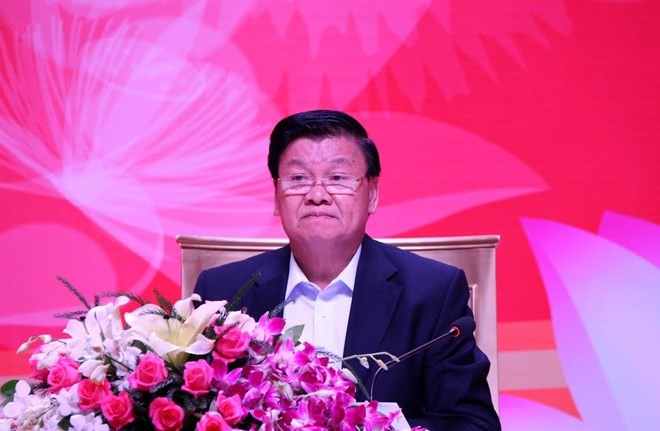 Politics & Law
Politics & Law

Lao Prime Minister Thongloun Sisoulith vowed that his Government would create the most favourable conditions for Vietnamese investors, during his first-ever dialogue with the Vietnamese business community in Laos.
 |
| Lao Prime Minister Thongloun Sisoulith vowed that his Government would create the most favourable conditions for Vietnamese investors, during his first-ever dialogue with the Vietnamese business community in Laos. — VNA/VNS Photo Phạm Kiên |
VIENTIANE — Lao Prime Minister Thongloun Sisoulith vowed that his Government would create the most favourable conditions for Vietnamese investors, during his first-ever dialogue with the Vietnamese business community in Laos.
The talks, held in Vientiane on Friday, provided a venue for Vietnamese investors to directly discuss with the Lao government the difficulties and obstacles they face while doing business in Laos.
The most-heard complaints include procedures for granting investment licences; land use and ground clearance policies; problems with import and export of goods and temporary import and re-export services; taxation, related fees and tax refunds; human resources and visas for labourers; and the overall business environment.
Sisoulith emphasised that his presence at the meeting, along with more than half of Laos’ cabinet members, demonstrated the importance they attach to Vietnamese investors and their commitment to enquire about the problems and lack of timely solutions that hinder operations of Vietnamese firms in Laos.
He noted that after 15 years, Việt Nam has become the third largest foreign investor in Laos, which demonstrates the close ties between the two countries in all fields. He pledged to direct ministries and sectors to work with the Vietnamese firms to resolve specific matters.
The PM also asked the Vietnamese investors to co-operate with Laos in improving the working mechanisms and its management capacity.
He also informed the investors that Laos has ceased granting land for rubber plantation and licensing new mining projects, citing low rubber prices, shortages of labourers and land, and environmental protection as reasons for the decision.
Sisoulith underscored that the Lao government encourages investors from countries throughout the world to join in fair competition, requesting them to strictly abide by the country’s laws.
During the dialogue, leaders of Lao ministries also answered questions from Vietnamese enterprises.
Deputy Prime Minister and Minister of Finance Somdy Douangdy promised to deal with the slow refunds of value-added taxes, while Deputy Minister of Labour and Social Welfare Baykham Khattinha said the ministry will consider specific foreign-funded projects. He also called for more manual labourers, despite the 10 per cent cap imposed on manual labour for each project.
Speaking to Vietnam News Agency’s correspondents in Laos, General Director of PV Oil Laos Nguyễn Kim Sơn said the dialogue is a success, as this is the first time the Lao PM had met with Vietnamese businesses to discuss problems they encounter in Laos.
Statistics from the Association of Vietnamese Investors in Laos (AVIL) show that Vietnamese investment in Laos has continuously increased in the period between 2011 and 2015, in terms of both numbers of projects and capital.
As of the end of September 2016, Việt Nam had 266 licensed projects in Laos, with a total registered capital of US$5.1 billion, up 1.3 times and 1.26 times, respectively, from 2011 figures.
Vietnamese-invested projects are located in 16 of the 18 provinces and cities in Laos, many of which have contributed significantly to the local socio-economic development. The projects paid $240-260 million to the Laos’ State budget each year and created jobs for 35,000 labourers. The figures are expected to increase to $350-400 million and 45,000 labourers in 2017, and continue to rise in the future. — VNS




